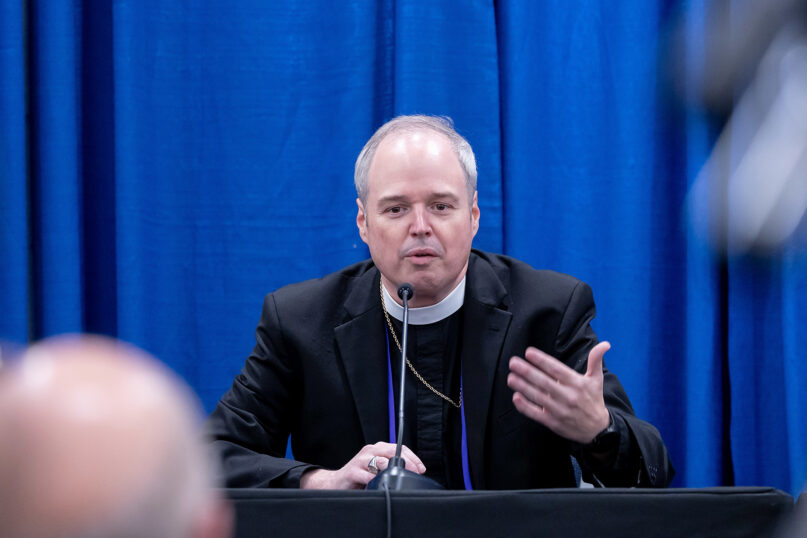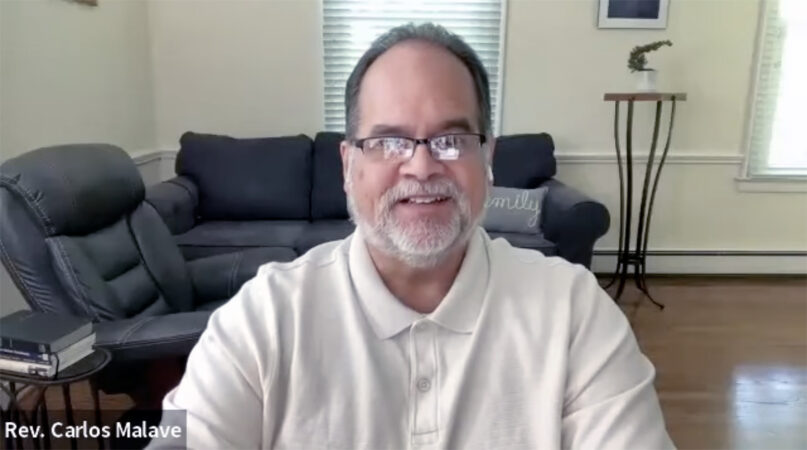(RNS) — Faith leaders expressed a strident commitment to continue to follow their moral compasses on immigration, including refugee resettlement issues — despite any potential retaliation from the Trump administration — at an RNS webinar on Tuesday (May 20).
“Institutional resistance is now more important than ever,” said the Most Rev. Sean Rowe, the presiding bishop of the Episcopal Church. “The church may be one of the few institutions that will be able to stand up and to tell the truth along the way, and not fold to demands and continue to be asked to make compromises on our moral decision-making.”
Rowe spoke about faith-based lawsuits, explaining the Episcopal Church’s decision to end its refugee resettlement partnership with the United States government over the Trump administration’s new focus on resettling white Afrikaners from South Africa. The Episcopal Church has a long history of opposing apartheid in South Africa, and Rowe said the Trump administration created “a real distortion of the facts and of the truth” when claiming Afrikaners were now being subjected to racial discrimination in the country post-apartheid.
“Afrikaners don’t fit any definition of refugee,” Rowe said, explaining that he spoke with Cape Town Archbishop Thabo Makgoba about the many Africans fleeing violence who were now “jumped” in line by the white Afrikaners to get to the U.S.
Rowe acknowledged that some argued Episcopal Migration Ministries should resettle Afrikaners now to be able to hopefully resettle other refugees later. However, he defended the church’s decision by saying, “The problem with any kind of Faustian bargain like that is that the devil always wins.”

Several other faith-based refugee resettlement groups have told RNS they are providing or will provide services to a small number of Afrikaners arriving in the U.S. Church World Service and World Relief, two such agencies, both urged the Trump administration to resume refugee resettlement as normal.
The Rev. Carlos Malavé, president of the Latino Christian National Network, said, “As followers of Jesus, we must be faithful to our call.
“We cannot shy away from being prophetic and to name the evils that we are seeing coming out of the policies of the administration,” he said.
Malavé said the task now is to articulate a Gospel worldview coming from Jesus Christ, “a worldview in which every human being is loved, accepted, cared for, without any difference among them.”
Immigrant families attending churches in his network had initially been afraid to go to sensitive locations like churches, hospitals and schools after the Trump administration lifted restrictions on immigration raids at those sites. But now, with time to reflect, Malavé said, these families are leaning on their faith.
“They have come to think, yes, there’s danger out there, but I’m in God’s hands. My family is in God’s hands,” he said.
Elizabeth Reiner Platt, director of the law, rights and religion project at Columbia Law School, said during the first months of the second Trump term, “There’s much more of a wide-scale institutional interest in these religious liberty arguments that I didn’t see in the first Trump administration.”
Three lawsuits challenging the Trump administration’s change to the sensitive locations policy have mostly relied on protections within the Religious Freedom Restoration Act, which Reiner Platt explained is the “most robust protection against infringements on religious liberty,” going even beyond the First Amendment.
Rowe and Malavé both acknowledged concerns that the Trump administration would retaliate against faith groups that fight its policies, even by seeking to remove their tax-exempt status.
Malavé expressed more concern about that scenario, but Rowe said, “I think there’s going to be some other ways that the administration may choose to retaliate or target the Episcopal Church, but we’re running scenarios. We’re prepared — as prepared as we can be in this time.”

“Discipleship is costly,” Rowe said. “We’re not used to that, particularly as a privileged institution like the Episcopal Church. And hopefully, we can stand the test of time.”
He added, “We have to speak out. This is the kingdom of God. It’s not the kingdom of this world.”
Original Source: